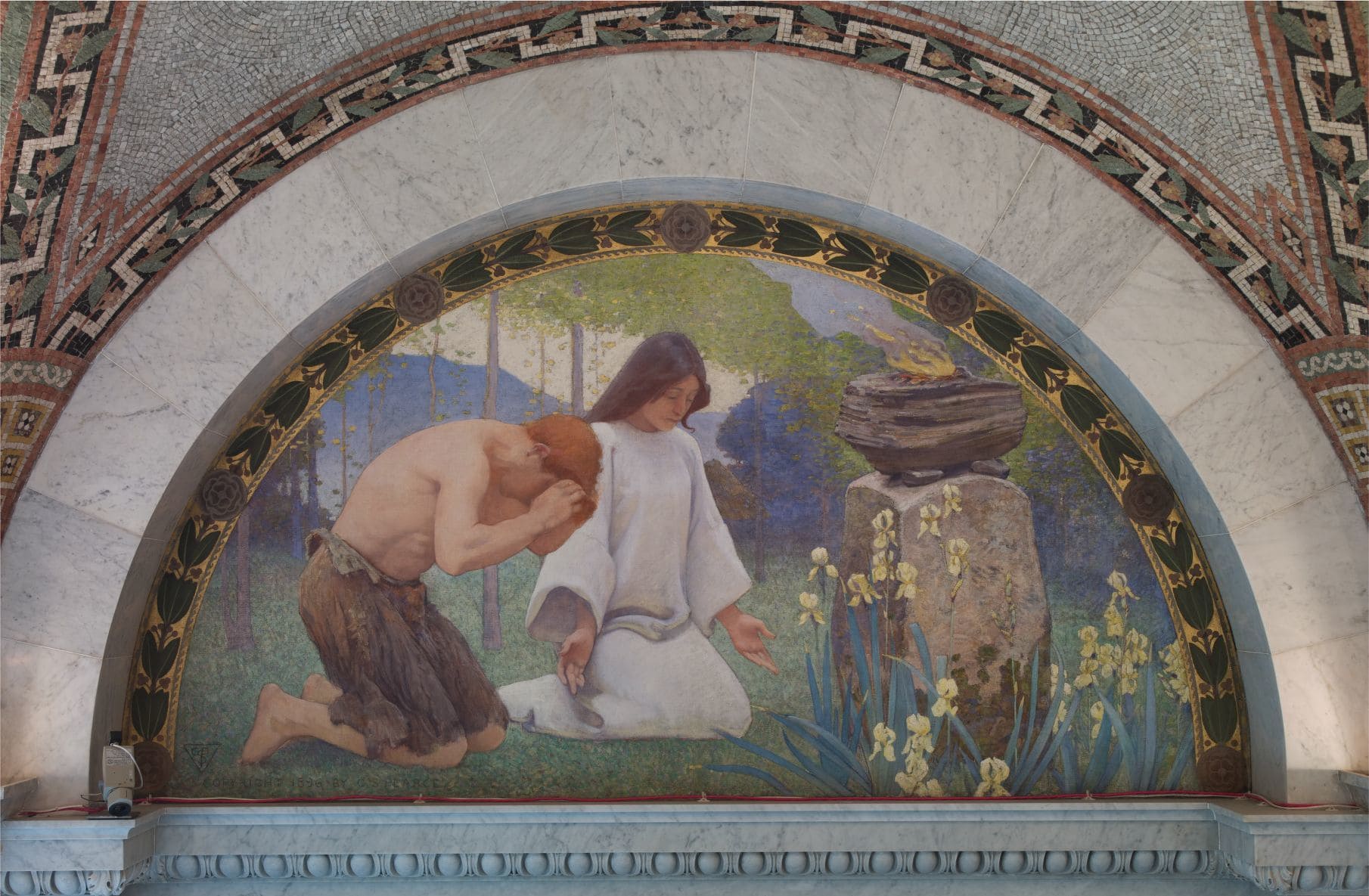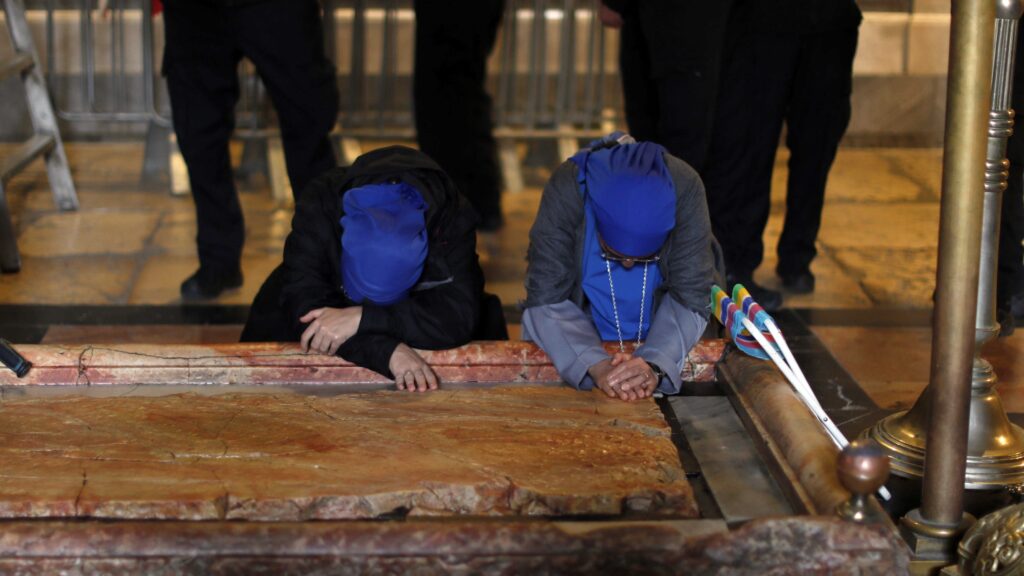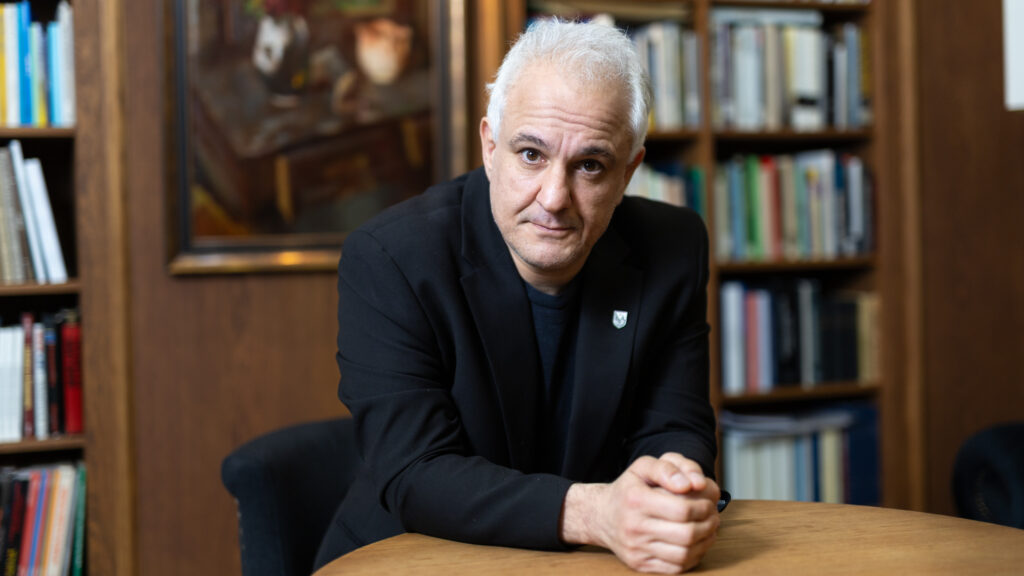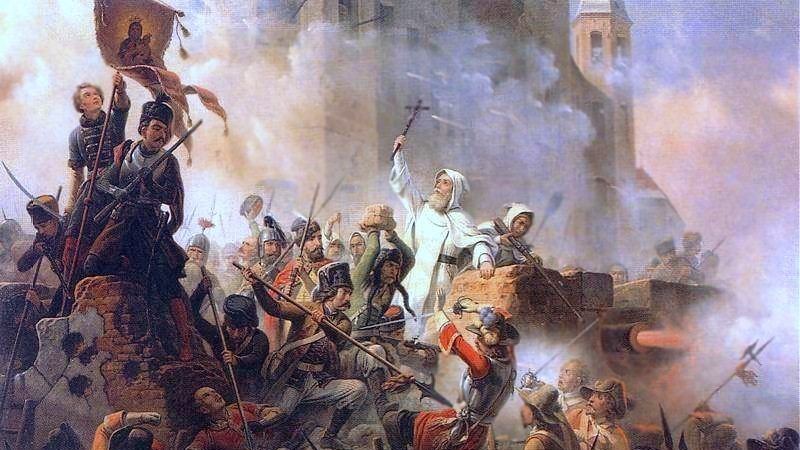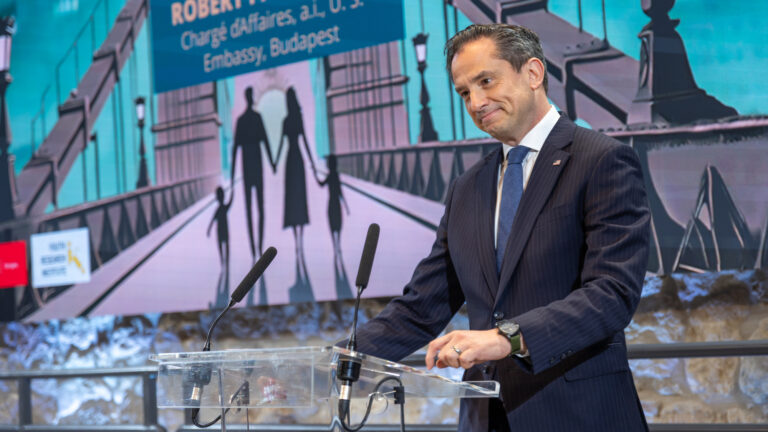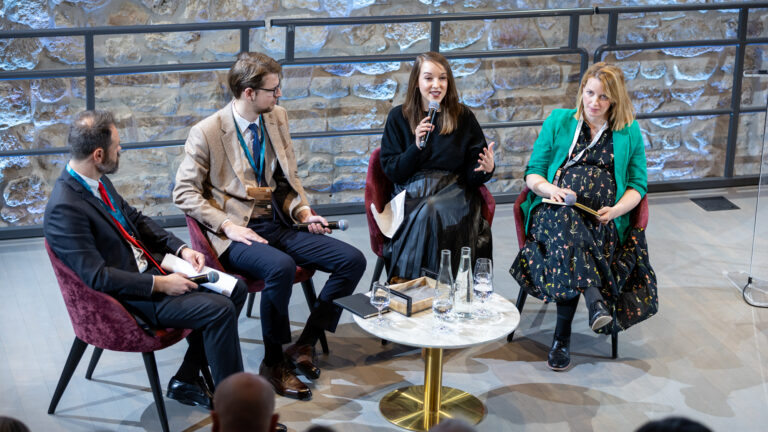We have yet to take into account the major transformation that is occurring in our time: the end of a sixteen-century-old civilization. The death of Christendom is by no means a sudden death. Indeed, with a very few exceptions, civilizations do not die sudden deaths: they die little by little, by many stages. Christendom has fought for two centuries not to die, and in that consists its moving and heroic agony.
The incredible energy with which Christian culture has struggled for two centuries not to die, clearly shows that it did indeed form a world, a world cohesive in all areas of life— and it was called Christianity. Christianity built a civilization, which has lived according to its laws and dogmas, as best it can, for sixteen centuries.
The French Revolution could only be accomplished in opposition to Christianity, which was from the beginning and until recently too often the main enemy of modernity.1 Historians have clearly shown that the French Revolution of 1789, the fourth of its kind in the West, was quite different from those which preceded it. The Dutch, British, and American revolutions which upended the old social order leaned on a religious base like Archimedes upon his lever. All three were Protestant countries, with cultures which presented few obstacles to new ideas. The French Revolution, by contrast, had no traditional base to draw on, because the reigning Catholic religion rejected all its principles, starting with freedom and equality.
Consequently, the first three revolutions did not fall into vengeful and absurd utopian thinking; they installed stable regimes, and created societies where politics and religion supported each other. The French Revolution, meanwhile, led to a perpetual war between church and state, with all theattendant consequences: entirely deprived of the spiritual, the political inevitably falls into sinister excesses. The church, reduced to the status of a public enemy and perpetually in revolt against the new laws and customs, was slowly withering away.
Christianity as a civilization is the fruit of Catholicism, a holistic religion, defending an organic society, challenging individualism, and individual freedom. It was natural for it to clash with modernity, and once it had reached its zenith, its fate was to disappear. Of course, there were attempts to adapt Christianity to the modern ideas that were sweeping across Europe and taking root. In the nineteenth century, we see such an attempt in the writings of Charles de Montalembert and the current of liberal Christianity. However, these adaptations never achieved a stable coherence. It is always a matter of accommodation, with a whiff of betrayal. The fate of Christianity makes it irremediably inclined to reject modernity, which challenges its first principles: truth, hierarchy, authority, and coercion.
Late modernity, which dates from the end of the Second World War, unquestionably regards the church as an obsolete institution. During the second half of the twentieth century and the beginning of the twenty-first, the differences between the church and prevailing cultural forces would accumulate. The currently reigning liberalism/ libertarianism represents precisely the antithesis of ecclesial thinking.
Today the overwhelming majority of church clergy and congregations are committed to modern principles of freedom of conscience and religion—only a few small groups dare openly defend the postulates of the Syllabus. What is more, the majority of church clergy and the faithful feel shame and remorse when they reflect upon the radicalism of the Syllabus.
A prophetic, if possibly apocryphal, remark attributed to André Malraux stated that ‘the twenty-first century will be religious or it will not be’. We Christians tend to like this sentence, which reinforces the will to resist time: we took ‘religion’ as implying ‘Christianity’. But the spiritual situation did not develop as expected. Of course, the twenty-first century is religious, but it is no longer Christian. Other religions have taken over the scene.
There is no great prophetic power in predicting that a century will be religious— all centuries are. As long as humanity is imperfect and mortal (thus until the end of time, no doubt, despite the fabrications of post-humanism), it will give itself religions, wisdom, and morals. Only the extreme and fleeting rationalization of the Enlightenment, detached from reality, could believe in the future of atheism. We can add, in the light of recent circumstances, that atheism indeed represents a vanity of the strong spirit, finally an impossibility, since as soon as Christianity fell, all kinds of other gods took its place. No, the end of Christendom will not allow atheistic societies to emerge because that simply does not exist. Societies are not made up of a few intellectuals, but of people, to whom common sense whispers that there are mysteries behind the door, and who are at least agnostic if they are not believers. A disciple of Habermas, Hans Joas, writes ironically that ‘one can imagine a future without religion, and also without music, dance, and theatre’, etc.2 Ideals are reinvented differently, but disenchantment does not mean the reign of atheism and all-powerful rationalism. Daily experience confirms to us that morality did not disappear with the fall of Christendom, and even that morality pervades everything—but that is another story.
Neither civilization nor morality ends with Christendom. They orient themselves differently and follow different paths
We are not going through a descent into hell or a total loss of that which constitutes humanity. What we are witnessing instead is a paradigm shift that can be considered radical and questionable, but which nevertheless defends other honourable principles. My teacher Julien Freund, still haunted by nightmares of decadence, spoke of a New Age.3 I use this expression again. The New Age will be the age of wisdom and paganism, necessarily rediscovered after the challenge of transcendence. I think we have to understand the moment that we are living through as a revolution, in the strict sense of the return of the cycle, in both a moral and an ontological sense. Since the second half of the twentieth century, and particularly since the 1960s, our moral hierarchies have literally been reversed. It is not uncommon, concerning individual behaviour and social acts, that in a few years an evil has become a good and vice versa, that behaviour which was abhorred is now praised, that former admiration transforms into hostile challenge. In the world of our fathers, colonization was generous and admirable, while war was at times a necessary evil. Today colonization is seen as an unmitigated evil, as, very largely, is war. Homosexuality was banned and despised, while today it is not only justified but praised. Abortion, previously criminalized, is being legitimized and recommended. Divorce, which was once almost impossible then very difficult, no longer encounters any obstacle. Suicide was intolerable (suicides could not be buried in consecrated ground), while now it is considered a possible benefit, and the law in some countries may help to facilitate it.
In a society, rules of social conduct form a focal point, orienting common philosophical choices. To examine what is permissible, laudable, and forbidden at a given time is to glimpse the mindset of an era. Still, it is only the manifestation of something deeper: but a manifestation drenched in the blood and sweat of this precise society—and telling of its gods along with its conduct. Any signifying act reveals a sleeping belief, even if it is not conscious. You make the effort, sometimes painful, to remain with the difficult spouse instead of seeking a divorce: it is because you harbour, without knowing it perhaps, a certain powerful idea of fidelity to oneself, in other words of personal responsibility. You refuse to get rid of a superfluous and unwelcome embryo, it is in your consciousness that lies the rough, perhaps, but real certainty that there is a dormant dignity there. All behaviour engages beliefs that are often buried and secret.
The normative reversal that we have before us appears quite natural to many young people because children are always educated by their time more than by their parents. It bothers older people, but have they not always been bothered by the passing of time? It frightens some Christians, hence the Manif-pour-tous or the pro-life associations. We must put a name to this inversion. It translates and tells the story of the end of Christendom. And it will be even easier to understand if we go back to the origins: Christendom was established by a normative inversion, in the other direction.
The fourth century was a break in the paradigm, both in a philosophical and an ethical sense. The universe of the Christians was the reverse of that of the Romans: they introduced a dualism between the temporal and the spiritual, the here below and the beyond, men and God, while the ancient religious world was profoundly unified. The Romans must have felt as if they were entering a torn intellectual and spiritual world. Moreover, in the space of a few decades a reversal of mores took place. The old morality was replaced by another. In the context of what we now call society, in other words mores, there was an inversion of values. Everything must be reversed, as Tertullian, a second century Christian theologian wrote: ‘It is against all these prejudices that we have to fight, against the institutions, the ancestors, the authority of the thing received, the laws of the rulers, the reasonings of the wise; against antiquity, custom, necessity; against the examples, the wonders, the miracles, whose help strengthened all these adulterous divinities.’4 Long before Christianity, the Romans were monogamous. But divorce laws had become more and more permissive over time. In the end even women could ask for a divorce, which was quick and easy. The Christian emperors, on the other hand, penalized it, with very specific exceptions which became more and more restrictive, to the point where it was banned. Abortion and infanticide had always been legitimate among ancient peoples, except among Jews and Egyptians. The Greeks and Romans practiced them widely—the typical Roman family kept only the first-born among its daughters. This was in accordance with the law of patriarchy: the foetus, or the child, belonged to the father, who was entitled to dispose of it as he saw fit. The Jews and then the Christians always rejected these practices.5 The Christians now in power condemned them. Homosexuality, as well known in Athens as pederasty or paedophilia, enjoyed the same license in Rome, although with important variations. In 390, a law of Theodosius condemned the exoletos (male prostitutes) to the stake.
Within half a century, the normative reversal had taken place. The new morality spread from the centre to the peripheries, always slower in the countryside, as usually happens—hence the peasant, paganus, gives us the word pagan. The term ‘pagan’ is both convenient and inappropriate. He is a creation of his adversaries. The unfolding and dissemination of Christianity from the centre to the outskirts, from places of culture to the villages, was accompanied by a feeling of pride, as if the new was better. The ‘pagans’ appear as conservatives walking backwards. And Christians call themselves ‘modern’—the word modernus appears at this time.6 Paganism is viewed as superstitious, obsolete, and outdated. It is already a march towards progress: the winner appropriates the meaning of history.7
The revolutionary period in the eighteenth century was what can be called the beginning of the end of Christendom. At this time, those in the West begin to overthrow their common civilization. This process would last two centuries. It has been made up of comings and goings, of struggles between detractors and defenders. It often resembles the siege of a city. One could tell elsewhere the story of this succession of strikes, sometimes victorious and sometimes defeated. Take divorce in France. A law authorizing divorce was promulgated in 1792 during the Revolution. It was repealed in 1816 under the Bourbon Restoration. But divorce was then re-established in July 1884. A law of the Vichy regime of 2 April 1941 restricted the circumstances in which it was permitted. Finally, after the Second World War, the laws on divorce were made progressively more lax, until mutual consent was reached. The drive to root out the principles of Christianity has met with failures and setbacks. Christendom defends itself, and mobilizes all its ardour to maintain the legislative and penal power of its mores. Yet whatever happens and despite some episodic successes, the tide has been rising for two centuries, always in the same direction, and never stopping.
The recent history of abortion laws reflects the same upheavals, strewn with violent reactions on both sides. The demonstrators are screaming. The laws passed arouse cries of joy and cries of horror, and excesses everywhere. Passion is always involved. Women march by screaming that their bodies belong to them. Extremist groups are trying to block the operation of abortion clinics.
The same goes for marriage between two people of the same sex, for assisted reproduction, and for assisted suicide. Christians try to defend traditional morality with non-Christian arguments: they know very well that their dogma will not be heard at all. They base their arguments on nature, natural law, or seemingly only tangentially related points, though these are not necessarily less important. In doing so, they often find unexpected allies, as when today groups of psychoanalysts and psychiatrists devoid of religious convictions join forces with Christians in the fight for and defence of fatherhood. But all this bears little fruit. Our societies do not care about natural law, and tend to believe that this sort of thing does not exist, that we are the inventors of nature. They suspect, under the traditional principles, some desire for power. Whatever happens, the old principles are retreating step by step, sometimes quickly and sometimes slowly, but with regularity and certainty. Their Christian defenders continue the struggle only from inner conviction or self-aggrandizement. Convinced in advance of not winning their case or obtaining the slightest concession, they defend their spiritual position only ad majorem dei gloriam. Countries that resist total liberalization are singled out by others, treated as backward, as if it were an affront to good taste, good conduct, reason, and intelligence, not to erase old mores.
We can see that the currents that defend ancient morals, although supported by many voters, have difficulty finding representatives or rather find only extremist representatives, such as Donald Trump. The fate of a current condemned by history is to become more and more extremist, to lose its most competent defenders, and finally, by a sort of disastrous process, to end up resembling the description of its adversaries.
The normative inversion that we see at work here, through this quiet and decisive evolution that spans the nineteenth and twentieth centuries, represents almost the exact opposite of what happened in the fourth century. Plutarch’s cry, ‘The great Pan is dead’ might have anticipated the end of paganism—at least that is how Christians then interpreted it to their advantage. Pan, or Priapus, is the God of sex and violence. The present tense tells the story of the return of the great Pan—we have come full circle.
Comparing the two normative inversions, sixteen centuries apart, in one direction and then in the other, helps us understand that the current emancipation of mores is a response to a coherent impulse. It is in no way the consequence of some call for the future, which would pull us towards freedom—since in the fourth century, precisely the opposite movement took place, and was just as inevitable. It is simply the result of a radical transformation of beliefs. It is not about investing the ‘progress’ of some mysterious aura.
‘Progress’ simply consists, in each era, of reconciling realities (laws, customs, mores) with diffuse and sometimes still unexpressed beliefs, which evolve in silence
Where we see the quiet strength of the current bearer of the future, the one that holds shared beliefs: in the fourth century it was the Christians who invented the ‘modern’, and the pagans who were on the defensive. Why is such a current invested in the future? Because hearts and minds yearn to embody its principles which have not yet come to fruition. A normative inversion, especially of this magnitude, rests on a basic philosophical inversion. This is quite natural: we do not upset the whole of morality in this way on a mere whim—we do it because the foundations on which the old morality rested have been replaced by others. Each culture or civilization poses, at an original and decisive moment in its history, primordial ontological choices on which everything else is built and supported— morals and mores, laws and customs. For Christendom, this decisive moment was the time of the first councils, which established the outlines of the first truths on which sixteen centuries of Christianity would live: God, the person, and morality.
There comes a day when faith in first principles breaks down. As far as we are concerned, we are now living at a breaking point where the primordial ontological choices—concerning the meaning of life and mankind’s place in the universe, the nature of the world or of the gods, are overturned. If beliefs collapse, laws and mores will survive for some time without further justification and by force of habit alone—but that will not last, and they will eventually collapse under accusations of illegitimacy. What forms the basis of a civilization is not the truth—as all claim it—but the belief in a truth. And only this belief guarantees the persistence of the original choices.
A first ontological reversal of this magnitude took place with the birth of Judaism. Moses made his people pass, not without coercion, it must be said, from polytheism to monotheism. Tacitus sums it up this way: ‘Moses introduced new religious practices, quite opposed to those of all other religions. The Jews regard as profane all that we hold sacred; on the other hand, they permit all that we abhor.’8 We see here the link between ontological inversion and normative or moral inversion.
Historians of religions have differentiated between two types of religions: cosmotheisms or polytheisms which are natural and obvious, and monotheisms or ‘secondary religions’, which are more complex constructions. The secondary religions appeal to the concepts of revelation, faith, and interior wisdom, meaning that they are constructions and always need to be reaffirmed and maintained by constant effort. At the same time, the primary religion arises, so to speak, on its own, proliferates without fertilizer, and instantly occupies or re-occupies a space as soon as it is free. This is what is happening to us today.
Cosmotheism has never disappeared from the scene in Western societies shaped by monotheism. Many beliefs, ideals, movements, or authors are inspired by it to varying degrees: alchemy, Kabbalah, Spinoza, Freemasonry, Lessing, German romanticism, Goethe, Freud, Nazism, New Age spirituality, and so on. We can be sure that cosmotheism remains, dormant throughout, always reborn as soon as the secondary religion which replaced it shows signs of weakness. In his famous 1917 lecture, ‘The Profession and the Vocation of Scientist’, Max Weber described how monotheism had dethroned polytheism in the name of universal reason, and how polytheism remained, ousted but lurking, awaiting its revenge.
Christians have long believed, and many still believe, that Christianity could only be replaced by atheism, nihilism, or both. In other words, by negative forms that would sow darkness and chaos. This is a way of believing yourself to be irreplaceable. Péguy wrote in Dialogue of History and the Carnal Soul: ‘That there have been so many peoples and so many souls where Christianity has not bitten, has not reached; so many peoples and so many souls who have lived abandoned, and who are not, who were not worse off, my friend, there, exactly there, unfortunately there is the secret, the hollow of the mystery.’9
To believe or make believe that if Christianity collapses, everything collapses with it, is nonsense. The Christian rule is already being replaced—neither by nothingness nor by the storm, but by well-known, more primitive and rustic forms of history. Behind collapsed Christianity come Stoic morals, paganism, and Asiatic spiritualities. Nietzsche had foreseen this evolution when he wrote: ‘European China, with a soft Buddhist-Christian belief and, in practice, an Epicurean savoir-vivre’.10 At the start of the twenty-first century, the most established and most promising philosophical current is a form of cosmotheism linked to the defence of nature. We can also speak of pantheism or polytheism.11 Our Western contemporaries no longer believe in a beyond or in a transcendence. The meaning of life must therefore be found in this life itself, and not above it, where there is nothing. The sacred is found here: in the landscapes, in the life of the earth, and in humans themselves. At the turn of the twentieth and twenty-first centuries, we have changed the paradigm by making a new choice in understanding the world. Under cosmotheism, man feels at home in the world, which represents the only reality and which contains both the sacred and the profane. Under monotheism, man feels a stranger in this immanent world and longs for the other world. For the monotheist, this world is only a temporary lodging. For the cosmotheist, it is a home. The postmodern mind is tired of living in a temporary lodging! It needs a home of its own, complete in its meanings. One becomes a cosmotheist again because one wants to reintegrate oneself into this world as a full citizen, and no longer as this ‘domiciled foreigner’, this Christian described by the anonymous author of the ‘Epistle to Diognetus’.12
The postmodernists want to do away with distinctions—their favourite adjective is ‘inclusive’. And cosmotheism suits them because it erases the old dualism characteristic of Judeo-Christianity. It requires escaping‘Progress’ simply consists, in each era, of reconciling realities (laws, customs, mores) with diffuse and sometimes still unexpressed beliefs, which evolve in silence.’ the contradictions between the false and the true, between God and the world, between faith and reason. Ecology today is a religion, a belief. That is not to say that the current ecological problems should not be considered scientifically proven, but rather that these scientific certainties about climate and ecology produce irrational convictions and certainties; in reality they are religious beliefs, endowed with all the manifestations of religion. Today, ecology has become a liturgy: it is impossible to omit the question, one way or another, in any speech or fragment of speech. It is a catechism: it is taught to children from nursery school on, and repeatedly, to help them acquire good habits of thinking and acting. It is a consensual dogma—whoever questions it, or raises the slightest doubt, is considered mad or evil. But above all, and this is the clearest sign of a vigorous belief and certainly not of a rational science: the passion for nature makes us accept all that was challenged by almighty individualism— personal responsibility, debt imposed on descendants, duties towards the community. It is therefore in the name of this immanent and pagan religion that we are reintegrating the indispensable dimensions of existence, which previously were taken into account and cultivated by Christianity.
The new ecological religion is a form of postmodern pantheism. Nature becomes the object of a cult, only partly based on reality. Mother earth becomes a kind of pagan goddess, and not only among indigenous Bolivians, but among Europeans as well. So much so that Pope Francis speaks today of ‘our mother the earth’, in a Christian sense of course, but leaving open the ambiguity that allows the link with contemporary beliefs. Our contemporaries defend in all its forms a nature distorted by humans, but also they hug trees. We are at a stage where, in the vast field opened up by the erasure of Christianity, new beliefs waver and tremble.
Disaffection with dogmas, or with a decreed and certain truth, brings about the triumph of morality. It stands alone now in the world. We see philanthropy at work, a love for humanity directly inherited from the Gospel, but without the foundations. Late modernity takes up the Gospel, but strips it of all transcendence. For contemporary American political scientist Joseph Bottum, today a disfigured Protestant morality without transcendence dominates morality across the Atlantic. Adherents of Protestantism in the USA have declined from around 70 per cent of the population to 43 per cent in half a century, and the new deadly sins are intolerance, power, militarism, and oppression. In other words, a degraded Gospel has produced the decolonialist present. And, we must add, after producing communism in its time.
We remember that in pagan societies, religion and morality are separate: religion demands sacrifices and rites, while the rulers impose a morality. This is the situation we are in the process of rediscovering: our governing elite decrees morality, promotes laws to enforce them, partly through insults and ostracism. Our morality is post-evangelical, but it is no longer tied to a religion. It dominates the television sets. It inhabits all the cinematography of the age. It rules in schools and in families. When something needs to be straightened out or given a new direction, it is the governing elite that does it. The European rulers represent in this respect the tabernacle of the clericature. In short, we have returned to a typical situation of paganism: we have a state morality.
What has or will become of the church without Christendom? Faced with the radical upheaval of which I outlined some broad features above, the reactions of the institution are diverse. But the most common, and especially among clerics, is now resignation and renunciation. The time is long past for the soldiers of the Syllabus; even if a few scattered individuals remain, they are folkloric rather than meaningful figures.
But things go further. Church personnel, disarmed in every way, have not only ceased to claim lost power, they even repent of having used and abused it. Church leaders are now silent and discreet apostles, far removed from those proselytizing figures recorded in the traditions of the church. Conquest is no longer in vogue, but has been replaced by humble testimony, to which, moreover, we quickly refer when confronted by those who see the assimilation of the past as merely the result of propaganda. Conquest is banned for religion as it is banned for states.
Reduced to the state of silent witnesses, Christians today are doomed to become soldiers in a lost war. Their fights—especially fights on societal issues, since they concern principles and virtues—lead nowhere, and moreover have no chance of success. I am not sure the approach has been a wise one. Christians who protest tirelessly and try to prevent or overturn rogue laws on abortion or assisted reproduction can only be successful by first implementing a spiritual revolution. First convert people to Christianity, to the intrinsic dignity of each embryo, and then you can abolish abortion. Otherwise it would be like trying to impose confession on non- Catholic peoples: terrorist nonsense. Belief and adherence to principles precedes the acceptance of laws.
Far from wanting to conquer the world, from now on, like the Jews, we are going to worry about living and surviving—and that will be enough. Search everywhere, and nowhere will you find a dream of mission and conquest—and although sometimes they exist in certain secret hearts, they dare not tell one another. Deep down, many Christians are relieved to see the extinction of Christendom, with all its supposed force and hypocrisy. We are all, Christians or not, the children of this era: preferring gentleness to domination, assumed imperfection to swagger.
When one cannot be a power, one can be an example, Camus claimed. Modernity, in fact, is probably both a rejection of Christian power (a challenge to societal laws), and a revival and adaptation of Christian principles (especially social ones). In all its dimensions, it is established against Christianity as a civilization, and not against Christianity. It only challenges the power of religion and not religion itself, as Tocqueville wrote: ‘it was much less as a religious doctrine than as a political institution that Christianity had kindled this furious hatred’.13 Ultimately, to ask whether Christendom as a Christian civilization was legitimate or not is an idle question. It is more important for us today to decide on the frame of mind with which we should approach the rest of the story.
We must, I believe, resist the temptation to transform Christian thought into an ideology, which brings us into a world bisected by a blade, and soon leads to a Manichean worldview. Beliefs become more certain. Tolerance is fading. A culture that feels threatened embraces its troops like a country at war.
Yet some of us would still like to live in the former Christianity, freeze its last expressions before closing—‘stop, Lord, the clock with which You measure our breakup’, as Lucian Blaga famously put it. For most of us, the past has become a foreign land—and, I will add, unwanted. After the adventures of the last two centuries, sometimes moving and sometimes deadly, we have given up. It is no longer Christendom leaving us—it is we who are leaving it. Why? Because we have given up the reign of force.
In other words, can we not invent another mode of being than that of hegemony? Should the mission necessarily be synonymous with conquest? One can imagine a Christianity on the model of the monks of Tibhirine rather than on that of Sepúlveda. Probably it would be better if we were only silent witnesses, and ultimately secret agents of God. Since despite the normative and philosophical inversions, Christianity is still, in its way, the spirit of the place. Renouncing Christendom is not a painful sacrifice. The experience of our fathers brings us a certainty: our business is not to produce societies where ‘the Gospel governs the states’, but rather, to use the word of Saint-Exupéry, to ‘walk very slowly towards a fountain’.
NOTES
1 With the exception of the Protestants, of course. The term ‘Christianity’ includes here the Catholics and the Orthodox.
2 Hans Joas, Les Pouvoirs du sacré (Paris: Le Seuil, 2020), 109. (Our translation.)
3 Julien Freund, Le Nouvel Age (Paris: Marcel Rivière, 1970)
4 Tertullien, Aux Nations, II, I, in Œuvres complètes, translated by A. E. Genoud (Amazon Italia Logistica, 1952). (Our translation.)
5 For example Philo of Alexandria maintains that the foetus is a ‘living being for itself’, that is, a person, and an innocent one; to get rid of it is therefore an assassination. De Specialibus Legibus III and IV (Paris: Le Cerf, 1970), III, 37–119.
6 Letter of Pope Gelasius I (492–496) to bishops Rufinus and Aprilis, in Patrologia Latina, Vol. 59, Col. 152 (1862): ‘Quis aut leges principum aut partum regulas aut admonitions modernas dicat debere contemn …?’ (‘Who would say that one has to disdain the emperors’ laws, the rules of the Fathers and the modern admonitions …?’)
7 Paul Veyne, Quand notre monde est devenu chrétien (Paris: Albin Michel, 2007), 170.
8 Tacitus, Histories, Book V, IV. (Our translation.)
9 The italics are those of the author. Charles Péguy, Dialogue de l’histoire et de l’âme charnelle, in Œuvres en prose (Paris: Gallimard, coll. ‘Pléiade’, 1957), 703. (Our translation.) Friedrich Nietzsche, Fragments posthumes 1887–88, in Œuvres complètes (Paris: Gallimard, 1986), 86. (Our translation.)
11 For example Michel Tarrier, author of Les Orphelins de Gaïa (2012) makes an apology of pantheism and polytheism at the website Agora Vox on 4 January 2012.
12 Épître à Diognète V, 5 (Paris: Le Cerf, 2005), translated by H. I. Marrou.
13 Alexis de Tocqueville, L’Ancien Régime et la Révolution (Paris: Gallimard, 1967), 63.

